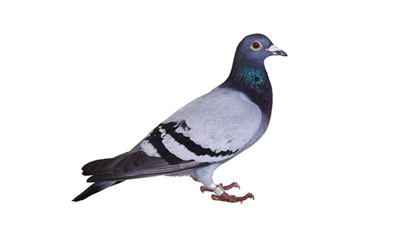(单词翻译:单击)
听力文本
This is Scientific American — 60-Second Science. I'm Christopher Intagliata.
When he worked in a pharmacy in Portugal, Fernando Moreira often encountered people who stopped by for performance-enhancing drugs...for their racing pigeons. "Yes, I saw it very often."
Pigeon racing is big business. A bird named Bolt—as in Usain—sold for nearly half a million dollars a few years back. So there's a big incentive to breed faster birds. And to illegally obtain performance-enhancing drugs for them.
"Some doctors make prescriptions that are supposedly for the humans, for the owners of the pigeons. And then the owners of the pigeons administer those drugs to the animals."
Moreira says that the pigeon fanciers, as they're called, freely admitted who the drugs were really for. And though the drugs can cause heart attacks in the avian athletes, there wasn't much he could do about it. "We cannot prohibit them to buy the drugs because they have a prescription."

And so Moreira headed to the University of Porto to get his doctorate. So he could figure out how to drug-test pigeons—and catch dopers in the act.
He and his team started by interviewing pigeon fanciers, anonymously, about their drugs of choice, so he'd know what to test for. They spiked pigeon poop with four popular doping compounds, a beta-blocker and three corticosteroids, and devised a test that uses mass spectrometry to quantify them.
Then, in a more real-world scenario, they doped two pigeons with a corticosteroid and successfully used their method to screen the birds' feces—a test that still works as many as three days after the pigeon is drugged. The results are in the Journal of Chromatography B.
Moreira's already been contacted by veterinarians interested in the test. And now that there's a way to quantify drug residues in pigeon poop, he says it'll be easier to keep owners who break the rules from improperly feathering their nests.
Thanks for listening for Scientific American — 60-Second Science. I'm Christopher Intagliata.
参考译文
这里是科学美国人——60秒科学。我是克里斯托弗·因塔利亚塔。
费尔南多·费莫雷在葡萄牙的一家药店工作时,经常遇到来药店为赛鸽买兴奋剂的顾客。“是的,这类情况很多。”
“赛鸽”运动是笔大生意。几年前,一只名叫博尔特的鸽子卖出了近50万美元的天价。因此,巨大的利益促使人们培育速度更快的鸽子。当然这也诱使他们非法获得赛鸽兴奋剂。
“有些医生会给鸽主开出原本供人类服用的处方。然后鸽主会让鸽子服下这些药物。”
费莫雷说,鸽子爱好者坦率地承认这些药物喂给了鸽子。虽然这些药物可能导致赛鸽心脏病发作,但是费莫雷对此也无能为力。“我们不能禁止他们购买这些药物,因为他们有处方。”
所以费莫雷前往葡萄牙波尔图大学攻读博士学位。这样他就能了解如何对鸽子进行药物测试,并当场捉住服用了兴奋剂的赛鸽。
他和团队开始通过匿名方式采访鸽子爱好者,了解他们给鸽子服用哪种兴奋剂,这样他就能知道要测试什么。他们在鸽子粪便中掺入四种常见的兴奋剂化合物——一种β受体阻滞剂和三种皮质类固醇——然后设计了用质谱测定法测量兴奋剂的测试。
然后,他们在更现实的情况下给两只鸽子服用皮质类固醇,并成功地用他们的方法来筛选鸽子粪便,在鸽子服下兴奋剂三天之后,这种测试方法仍然有效。这项研究结果发表在《色谱B》期刊上。
对这项测试感兴趣的兽医已经联系了费莫雷。现在已经有了量化鸽子粪便中药物残留量的方法,因此他认为阻止违反规定的鸽子主不当获利会更容易。
谢谢大家收听科学美国人——60秒科学。我是克里斯托弗·因塔利亚塔。
译文为可可英语翻译,未经授权请勿转载!
重点讲解
重点讲解:
1. stop by 顺便拜访;顺路探望;
Perhaps I'll stop by the hospital.
也许我会顺路去一下医院。
2. figure out 想出;理解;弄清;
It meant I had to start from scratch and figure out where I fit in.
那意味着我必须白手起家并且得弄清楚我适合什么行业。
3. catch sb. in the act 当场抓住;抓现行;
When the police caught the thief in the act, he tried to brazen it out.
当警察当场抓住那个小偷时,他还企图抵赖
4. feather one's nests 营私;自肥;
Mary's much more interested in doing things for other people than feathering her own nest.
相比追逐私利,玛丽更乐意帮助他人。


